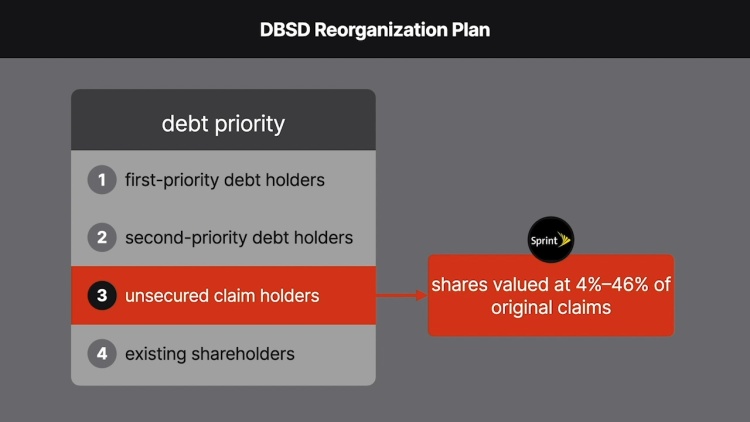In re DBSD North America
United States Court of Appeals for the Second Circuit
634 F.3d 79 (2011)

- Written by Denise McGimsey, JD
Facts
DBSD North America, Incorporated (DBSD) (defendant) was formed in 2004 by ICO Global Communications (ICO), which held 98.9 percent ownership of DBSD. In the process of creating a mobile communications network, DBSD acquired a significant amount of debt, which eventually proved too much to manage. In 2009, DBSD filed a Chapter 11 bankruptcy petition, listing debts including a $40 million revolving credit facility, $640 million in convertible senior secured notes, and an unsecured claim by Sprint Nextel Corporation (Sprint) (plaintiff) which had filed a then-pending lawsuit against DBSD. The credit-facility debt was secured by a first-priority lien in DBSD’s assets. The note debt, which had grown to $740 million by the time of DBSD’s petition, was secured by a second-priority lien. Sprint’s lawsuit sought a judgment of $211 million, but the bankruptcy court temporarily valued Sprint’s claim at $2 million for voting purposes. DBSD proposed a reorganization plan in which (1) the first-lien debt would be paid off over four years, (2) the second-lien debt would be paid through shares of the reorganized entity, valued at approximately 51 to 73 percent of the original claims, (3) the holders of unsecured claims, including Sprint, would receive shares of the reorganized entity valued at approximately four to 46 percent of the original claims, and (4) ICO would receive shares and warrants in the reorganized entity. The bankruptcy court affirmed the plan over Sprint’s objection. The court held that the plan did not violate the “absolute priority rule” because the property received by ICO was being gifted to it by the second-lien holders (defendant). The district court affirmed. Sprint appealed.
Rule of Law
Issue
Holding and Reasoning (Lynch, J.)
What to do next…
Here's why 907,000 law students have relied on our case briefs:
- Written by law professors and practitioners, not other law students. 47,100 briefs, keyed to 996 casebooks. Top-notch customer support.
- The right amount of information, includes the facts, issues, rule of law, holding and reasoning, and any concurrences and dissents.
- Access in your classes, works on your mobile and tablet. Massive library of related video lessons and high quality multiple-choice questions.
- Easy to use, uniform format for every case brief. Written in plain English, not in legalese. Our briefs summarize and simplify; they don’t just repeat the court’s language.





